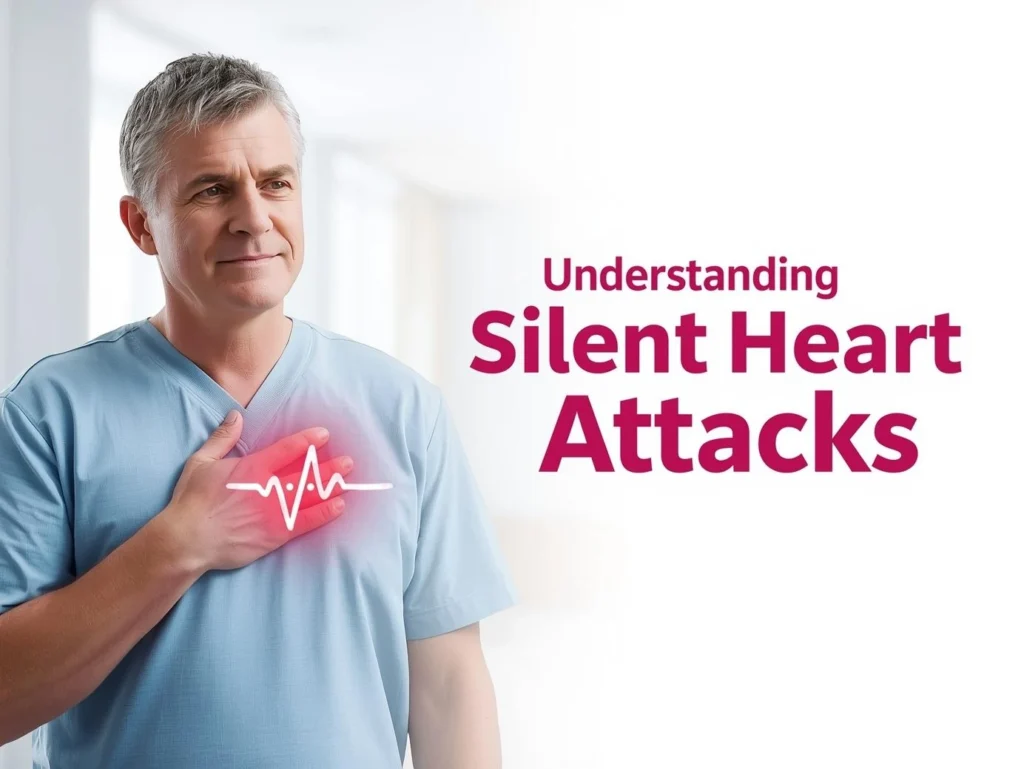Understanding Silent Heart Attacks and Their Hidden Risks for Everyone

Introduction
Silent heart attacks, also known as silent myocardial infarctions, are a dangerous form of heart attack that can occur without obvious symptoms. Unlike typical heart attacks, which often involve intense chest pain and discomfort, silent heart attacks may go unnoticed, putting your cardiovascular health at serious risk.
Many people wonder, Can you have a heart attack and not know it? or think, I had a heart attack, but now I feel fine.Understanding silent heart attack symptoms, recognizing cardiovascular risk factors, and taking preventive measures is crucial for protecting your heart. This guide explores silent heart attack causes, warning signs, early detection methods, and prevention strategies to help you maintain long-term heart health.
What is a Silent Heart Attack and How It Differs from Typical Heart Attacks
A silent heart attack occurs when blood flow to the heart is blocked, but the symptoms are mild, atypical, or completely absent. Unlike a typical heart attack, which produces crushing chest pain, silent heart attacks may only cause minor discomfort or no symptoms at all.
Silent heart attack symptoms may include unexplained fatigue, mild shortness of breath, or slight discomfort in the jaw, neck, back, or arm. People often only discover they had a silent heart attack during routine checkups, ECGs, or cardiac imaging. Understanding the difference between a heart attack without symptoms and a typical heart attack is essential for early detection and timely intervention.
Recognizing Silent Heart Attack Symptoms That Are Often Overlooked
Silent heart attack symptoms are often subtle and easily dismissed. Some individuals experience mild fatigue, brief chest discomfort, indigestion, or lightheadedness without realizing the severity. Mini heart attack symptoms can be mistaken for stress, minor illness, or normal tiredness.
Recognizing these silent heart attack warning signs early is critical to preventing serious heart complications. Paying attention to these subtle signals, especially if you have existing cardiovascular risk factors, can save your life. For further guidance, check our heart health tips to stay proactive.
Causes and Risk Factors of Silent Heart Attacks Everyone Should Know About
Silent heart attacks share many causes with regular heart attacks. Plaque buildup in coronary arteries, high blood pressure, high cholesterol, diabetes, and smoking all contribute to the risk of a heart attack without symptoms.
Lifestyle factors such as sedentary behavior, unhealthy diet, and excessive alcohol consumption increase the likelihood of silent heart attacks. Family history of heart disease also plays a significant role. Individuals with diabetes may experience muted symptoms, making silent heart attacks harder to detect. Learning how to prevent silent heart attacks through lifestyle adjustments and regular medical checkups is essential for long-term heart wellness.
Early Detection Methods for Silent Heart Attacks to Prevent Serious Complications
Early detection of silent heart attacks is crucial to prevent serious heart damage. Key methods include:
- Routine Checkups and ECGs: Regular electrocardiograms can detect silent heart attacks, even when symptoms are absent.
- Blood Tests for Heart Markers: Measuring cardiac enzymes can reveal heart muscle damage caused by silent heart attacks.
- Monitor Subtle Symptoms: Fatigue, mild chest discomfort, shortness of breath, or lightheadedness may be silent heart attack warning signs.
- Stress Testing: Stress or treadmill tests help identify reduced blood flow to the heart, indicating potential silent heart attack activity.
- Heart Imaging: Echocardiograms or cardiac MRIs provide detailed images of heart damage from a heart attack without symptoms.
Detecting silent heart attacks early allows healthcare professionals to intervene promptly, reducing the risk of future complications. Combining early detection with awareness of cardiovascular risk factors improves long-term heart health outcomes.
Prevention Strategies to Reduce the Risk of Silent Heart Attacks Effectively
Preventing silent heart attacks involves maintaining a heart-healthy lifestyle. A balanced diet rich in fruits, vegetables, whole grains, and lean proteins supports cardiovascular health. Regular physical activity strengthens the heart, improves circulation, and helps control blood pressure and cholesterol.
Additional preventive measures include quitting smoking, managing stress through meditation or relaxation techniques, and controlling chronic conditions such as diabetes, high blood pressure, and high cholesterol. Awareness of silent heart attack causes and symptoms, coupled with these lifestyle adjustments, significantly lowers the risk of heart attacks without symptoms. For more detailed guidance, read our comprehensive guide on preventing silent heart attacks.
Conclusion
Silent heart attacks are a hidden threat that can occur without noticeable symptoms. Recognizing silent heart attack symptoms, understanding your risk factors, and adopting preventive measures are crucial steps for protecting your heart.
Regular checkups, early detection, and lifestyle changes can save lives. Don’t wait until severe symptoms appear. Always consult a cardiologist if you are at risk, and start implementing heart-healthy habits today. Prioritizing your cardiovascular wellness and spreading awareness about silent heart attacks can help protect your loved ones as well.
Frequently Asked Questions
1.Can you have a heart attack and not know it?
Yes, silent heart attacks can occur without noticeable symptoms, making early detection critical.
2.What are the mini heart attack symptoms?
Mild fatigue, jaw or chest discomfort, and shortness of breath are common subtle indicators.
3.How is a silent heart attack diagnosed?
Through ECGs, blood tests, echocardiograms, or cardiac imaging during routine checkups.
4.What is the life expectancy after a silent heart attack?
With proper detection, treatment, and lifestyle changes, individuals can maintain a healthy life expectancy.
5.What is a silent heart attack?
A silent heart attack is a heart attack that occurs with minimal or no obvious symptoms, often detected later through tests.



